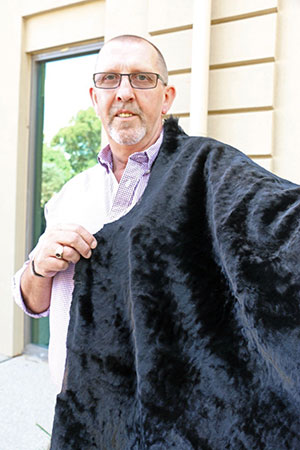SHEEP producers have been urged by a prominent southern Australian skin buyer to use only a keyhole crutch, minimise shearing cuts and avoid the use of branding fluid on sale lambs.
Paul Fitzsummons, PKF Skin Valuations principal, Adelaide, SA, sources skins from terminal and maternal lambs for the price sensitive export markets of China, Russia and Turkey.
A guest speaker at the Australian White Suffolk Association conference on February 12-13, Mr Fitzsummons said just 10 per cent of the nation’s daily lamb kill resulted in skins suitable for the dressing, or high quality apparel market.
The majority of skins are manufactured into floor rugs, footwear, baggage lining, car seats, cushions, soft toys, chamois and paint rollers.
Mr Fitzsummons said downgraded skin values were often caused by shearing cuts, grass seed damage, tender wool, ribbing, incorrect crutching, and the incorrect use of branding fluid or paint.

Paul Fitzsummons, PKF Skin Valuations, with a sample of Australian lambskins made into mouton for quality Russian clothing.
He recommended a small keyhole crutch with no shearing over the tail, shearing before lambs were lot fed to avoid “tender’’ wool, and moving stock to cleaner paddocks or shearing before seed set to avoid grass seed contamination.
On any given day at any Australian abattoir, there could be up to 15 skin buyers tendering for product.
The skins are valued on the live animal before they hit the kill chain to determine the dressing percentage plus skin size and quality.
Buyers then submit their prices in a daily tendering process at the abattoir.
Purchased skins are salted, graded, packed and shipped to Australia’s major export markets of China, Russia and Turkey.
“Over the last 15 years we have seen a dramatic change in the skins presented to skin companies for purchase,’’ Mr Fitzsummons said.
“Fifteen years ago, no matter what abattoir you went to in Australia to tender on skins, there would be around 35 per cent good dense wool skins of different breed types.
“Today, with reduced numbers of the flock, it’s hard to get good dense wool product for the dressing market.
“The amount of ribby wool, bald necks, bald bellies and strong wool makes it hard to get good quality product to sell to top end customers for fur coats, medical rugs, futon bedding, sheepskin boots and apparel.’’
Another problem is hide damage from grass seed and shearing scars.
“No one wants to wear a jacket or sheepskin boots with the light coloured marks caused from grass seed or shearing scarring,’’ Mr Fitzsummons said.
“The skin structure of a scar is a lot tighter and does not take tanning chemicals as well as the surrounding skin.
“The affected skins are only suitable for car seat covers, footwear linings or chamois.’’
Heavy ribbing, caused by a fat line in the carcass, results in skin suitable only for a secondary product, including baggage linings and footwear.
Mr Fitzsummons said the incidence of dermatitis and fly damage in skins had reduced over recent years.
“Branding fluid is an issue as it has to be scoured out – chalk marks are acceptable,’’ he said.
High quality Australian sheepskins are used to produce mouton clothing for the Russian market.
Made from lambskin, the mouton has a classic sheen and is usually lined with silk for coats and hats.
Six skins are used to manufacture each individual full-length mouton coat.
“Mouton is finished in such a way that water and snow will bead off it,’’ Mr Fitzsummons said.
“Ninety per cent of wool skins produced in Australia will end up in China, and out of that, 80 per cent will be domestically consumed within China.’’
A portion is made into leather and exported as footwear to India.
Mr Fitzsummons said price volatility in the skin market was caused by seasonal temperatures in Europe, household spend and competing fibres such as nylon and polyester.
He urged producers to be mindful of skin quality when breeding and feeding prime lambs to avoid coarse, broad or tender wool types.